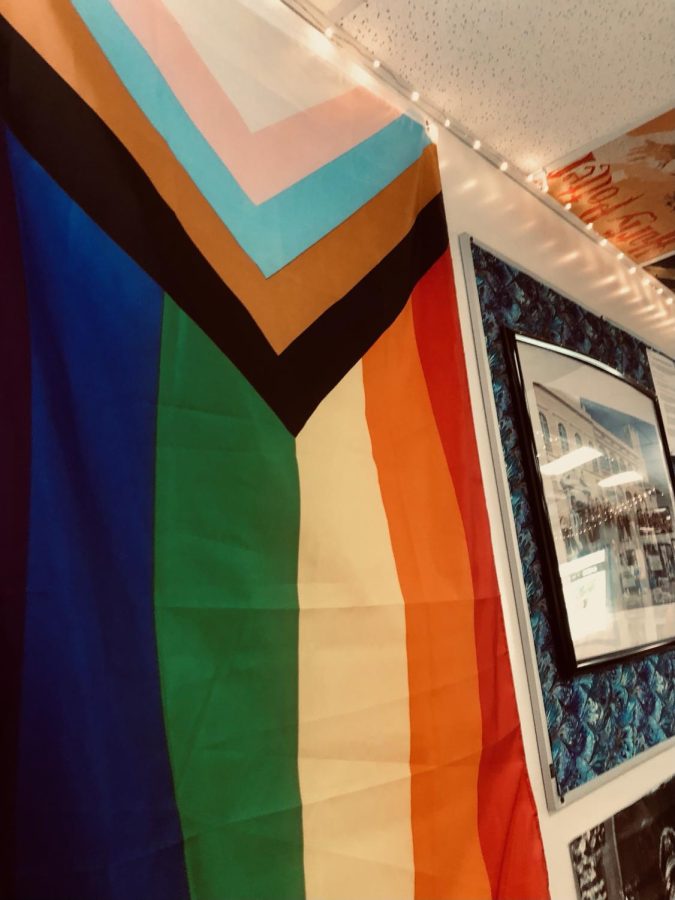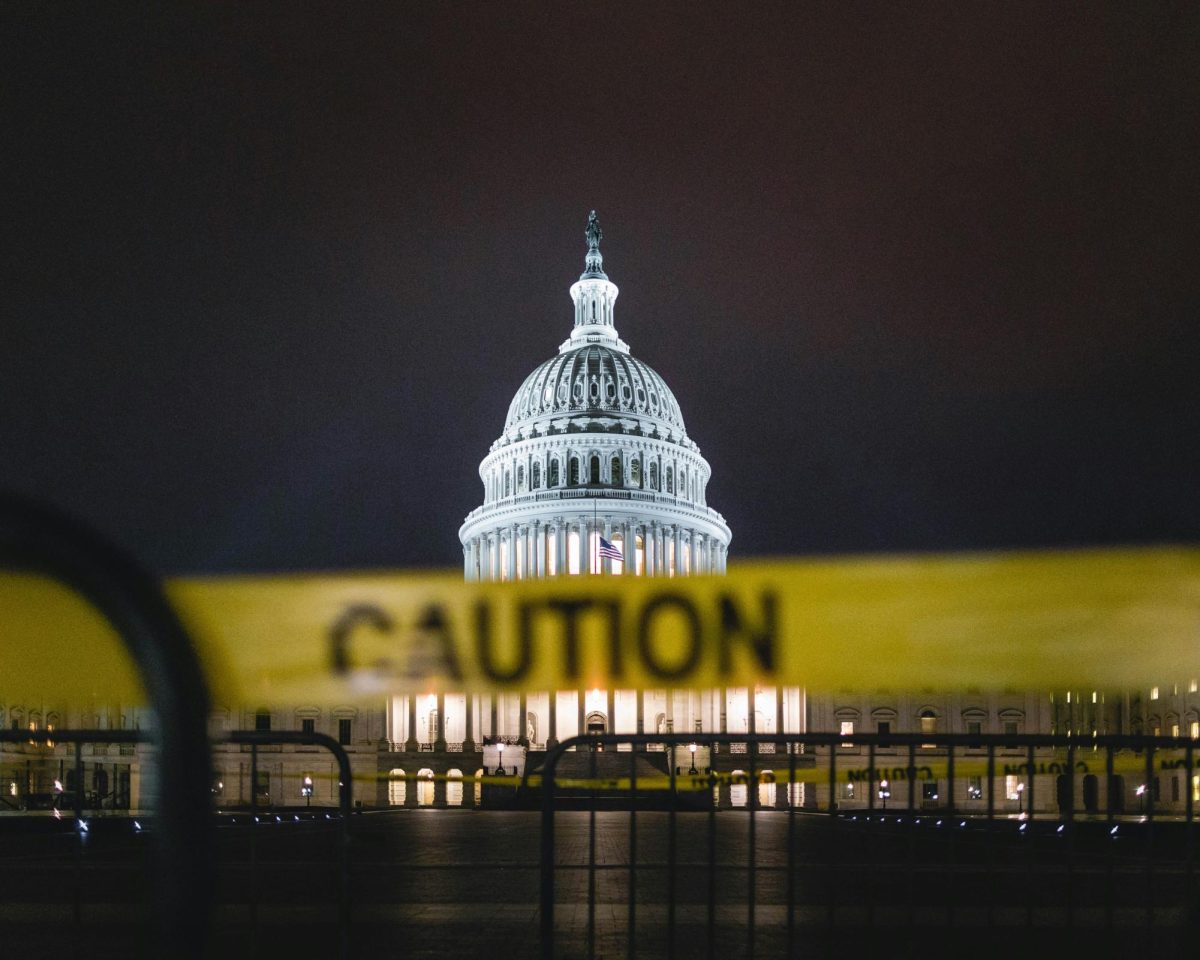Qatar’s past, present, and future: Homophobia and sexism
The mistreatment of Qatar’s LGBTQ+ and female population has been put under an international spotlight due to the 2022 World Cup.
A pride flag that flies high in a Los Alamitos High School English classroom.
December 14, 2022
LOS ALAMITOS, CA – Arrest, abuse, and forced conversion. While illegal in the United States, these are all punishments that Qatar’s LGBTQ+ population have faced for years on the basis of their sexual identities and orientations.
In addition to the mistreatment of migrant workers covered in the Griffin Gazette’s article “The 2022 World Cup stadium construction: Over 6,500 deaths,” Qatar is also under fire for other human rights violations. Qatar has had a history of detestation and disrespect against the LGBTQ+ community and the female population. Because of this, several fans felt apprehensive to travel to Qatar for the World Cup for fear of being arrested or rejected. Qatari officials assured fans that everyone would be welcomed, angering several Qatari citizens who have been persecuted for their way of life.
“Everyone is welcome,” a Qatari official said in a CNN interview. “Our track record has shown that we have warmly welcomed all people regardless of background.”
Qatar has gone as far as to hold human rights training for security guards and enact new legal protections for everyone. However, Qatari officials have also stated that a large portion of their culture is conservative, so public displays of affection by any couple are looked down upon. Because of this, though, a larger debate has opened up about what can be justified by culture and what goes against human rights. Furthermore, many Qatari citizens feel that many of the people condemning Qatar’s human rights misconduct are hypocritical. Qatar has called out Europe for purchasing oil from them while also criticizing their human rights violations. They have also questioned other critics as to why they have not denounced other Arab countries who have committed similar human rights violations, such as the United Arab Emirates.
Whether or not Qatar’s critics are hypocrites is up for debate. However, the mistreatment of women and LGBTQ+ citizens in Qatar cannot be denied.
In the case of women’s rights, Qatari women are oppressed under the male guardianship law, which requires women to gain permission from a male guardian to marry, divorce, work in government professions, travel abroad, and obtain reproductive healthcare. Women are almost completely owned and dictated by the men in their lives, whether that be their father or their husband. In addition, barely any women hold power in Qatar. In 2021, two women who didn’t run for election were appointed to the Shura, the Qatar parliament, after all twenty women who did run lost to men. As of now, four women are part of the Shura, and they are the only prominent forms of female representation in the Qatar government.
Despite the oppression they face, women across Qatar have worked to secure more rights for themselves. To support women’s rights in Qatar, you can visit websites for associations that fight for women’s rights such as the Qatar Foundation.
The situation for the LGBTQ+ community is no better than it is for women. There has been a long history of LGBTQ+ censorship in Qatar, and article 285 of Qatar’s Penal Code forbids same-sex relationships and extramarital sex, both punishable with up to seven years in prison. However, most of the arrested LGBTQ+ community in Qatar are detained under Law No. 17 of 2002 on Protection Community, which gives authorities the power to provisionally arrest any defendants who give them reason to believe they are breaking the law. In addition, several LGBTQ+ Qatari citizens have faced assault and abuse while in prison. There have been several reports of LGBTQ+ Qatar citizens being beaten, verbally harassed, and sexually harassed while detained for baseless charges.
“I was detained for three weeks without charge, and officers repeatedly sexually harassed me,” a transgender Qatari citizen said in an interview with Human Rights Watch. “Part of the release requirement was attending sessions with a psychologist who ‘would make me a man again.’”
The harsh treatment of both women and the LGBTQ+ community have served to demonstrate why many citizens are upset by the double standard being set by Qatar in the face of the World Cup. Many are angry that Qatar’s government will turn a blind eye for foreigners but not for their own citizens.
Despite Qatar’s claims that everyone is welcome, there have still been conflicts with different groups heading into the country. For example, Virgin Atlantic Airlines, a flying service that is well known for its gender neutral uniforms, suspended the very outfits that they pride themselves upon exclusively for flights to Qatar. The airline claims that the decision was made for the safety of both its staff and passengers, not wanting their gender neutral outfits to lead to the mistreatment or harassment of those affiliated with their airline while in Qatar.
Another huge point of contention was an armband protest planned by an array of European teams. Seven captains of European teams that qualified for the World Cup made a plan to wear “One Love” campaign armbands in support of diversity and inclusion in soccer. However, captains were threatened with on-field penalties and punishments if they followed through with the plan, leading to its dissolvement.
There has also been discussion stirring in the writing world following the unexpected deaths of three journalists visiting the Qatar World Cup. Two of the deaths were that of Qatari journalist Khalid al-Misslam and American journalist Roger Pearce. The circumstances surrounding both deaths remain unclear. However, the other death of 48-year-old American journalist Grant Wahl has raised questions due to the sudden and unexplained nature of his passing. Wahl collapsed suddenly while in Lusail stadium and was taken to the hospital where he unfortunately passed away. His death has not been given a cause yet, but many have drawn suspicion from the fact that he was denied entry to a Nov. 21 game for wearing a shirt with a rainbow on it in support of the LGBTQ+ community. However, Wahl was reportedly treated for bronchitis while in Qatar just days before his passing.
As the World Cup enters its semi-finals round, many are still wondering if the situation for women and LGBTQ+ citizens will be remedied as a result of the international spotlight Qatar’s policies have taken as well as the recent controversies concerning the World Cup, such as Wahl’s passing. However, Qatar continues to defend themselves and their policies.






